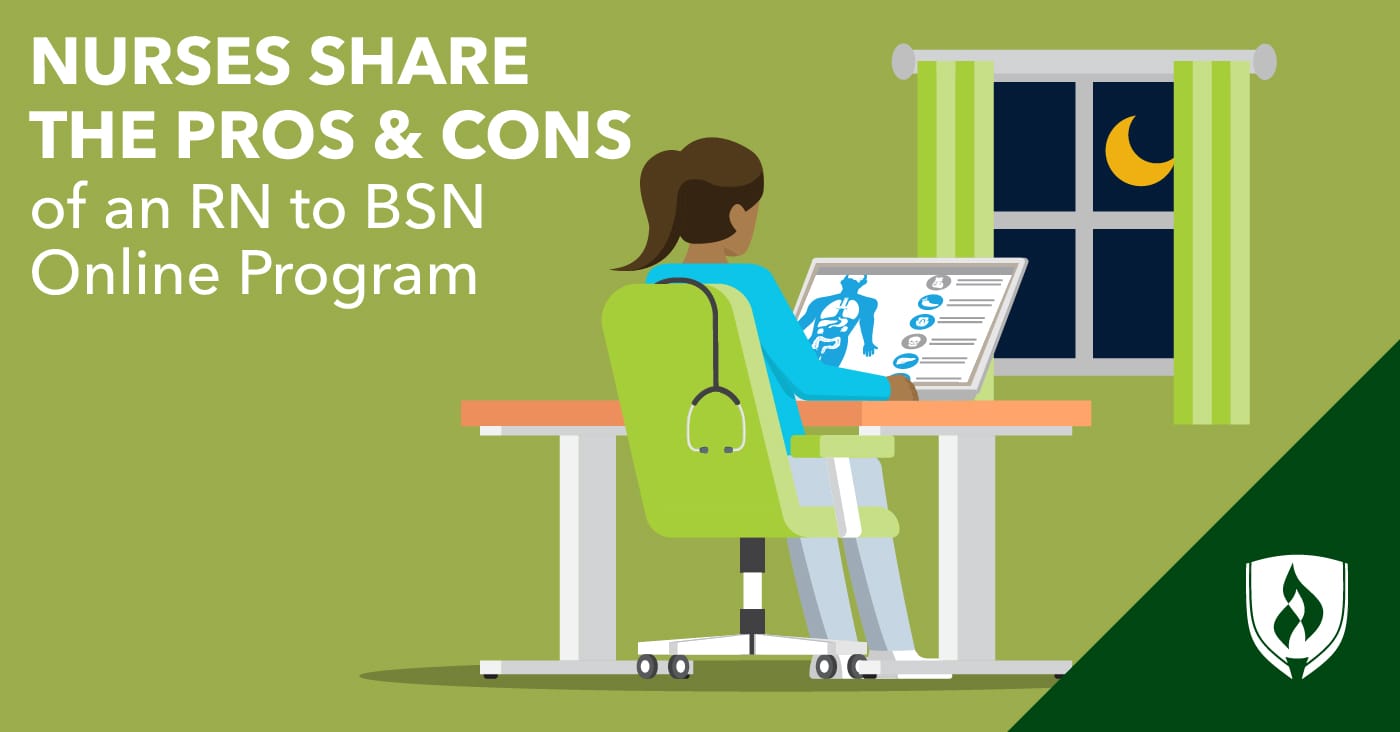
Working as a nurse, you’ve learned there is rarely a one-size-fits-all solution when it comes to meeting people’s needs. That applies to your patients, and of course, it applies to nurses, too. If you’ve been thinking of advancing your education as a nurse, an online RN to BSN program could be exactly what you’re for in terms of educational advancement, flexibility and affordability.
This specialized track allows current registered nurses (RNs) with Associate’s degrees to work toward their Bachelor of Science in Nursing (BSN) without having to start from scratch in Nursing school. To help you decide whether to advance your education and take the plunge, it’s a good idea to gather as much information as possible. Who better to learn from than other nurses who have once been in your shoes? Read on to see what nurses have to say about the pros and cons of an RN to BSN online program. Also check out qualities of the top nursing programs.
The pros and cons of earning an RN to BSN online
Pro: Attending school from home
The online format can be a major perk for some students. Instead of worrying about commutes or battling traffic to school, you simply log on to your computer. Instead of lugging your bag around a college campus while trying to balance your coffee, you can settle into the comfort of your own kitchen. Instead of arranging childcare or for someone to let the dog outside, you get to stay home with them.
Online RN to BSN programs recognize your existing experience as a nurse and help you bridge the gap to your BSN with as much flexibility and convenience as possible.
Con: Staying organized can be challenging
While you’d also have to stay on schedule in an on-campus RN to BSN program, the online platform makes some students think they can complete the courses when and how they want, but that isn’t quite the case.
According to Tami Rogers, PhD, DVM, MSN, CNE, CHSE and associate Nursing professor at Rasmussen University, online RN to BSN programs are not like independent studies. Students need to complete courses within certain time frames, and they will still have deadlines for their work.
And it might not always be just you and your homework. “Students often have to work collaboratively to problem-solve and complete course projects—much like the real world,” Rogers says.
While this is good news for learning, it can be hard to collaborate if you or other students get behind in their courses. It’s important to take your online classes seriously and keep yourself organized as the semester goes on.
Pro: More control over how you learn
Online programs in general tend to allow students more flexibility in their learning schedules. If you know you work best with a certain schedule, or even with certain resources, then you will have more opportunities to direct your learning in a way you prefer.
“I was homeschooled when I was a kid, so self-directed learning was a natural fit,” says Amelia Roberts, BSN-RN and owner of Solutions by Amelia. “I need to hear something being said in different ways. For this and other reasons, online learning was a good fit. It gave me the freedom to consume information in a format that was best for me.”
Roberts says people who are focused, self-motivated and goal-oriented are the ideal personality types for an online RN to BSN program.
Some programs allow for an even higher level of control, as well. Rasmussen University’s RN to BSN online program is competency-based. This format gives students control of how they tackle their coursework—they can choose to quickly work ahead in any subjects they’ve got a strong handle on, while taking their time with concepts they may yet need to master. Add this to a subscription-based pricing format that allows students to complete as many courses as they can in a six-month term for one price, and you can quickly see how these programs offer more control over your learning than you might expect.
Con: You need to be self-motivated
If you procrastinate or forget deadlines, an online RN to BSN program can be difficult. These programs maximize flexibility, and students who need more rules and accountability might have trouble staying on task.
“If someone has trouble with accountability, online learning may be a challenge,” Roberts says.
It’s certainly possible to fall behind or forget assignments in any format, but for some, the lack of being in the physical presence of an instructor or classmates makes it a little easier for things to slip through the cracks. Online learning requires you to be vigilant and still follow a schedule that is catered to your availability.
Pro: More interaction with technology
The healthcare industry is rapidly changing with technological advances. According to the Department of Labor, technology skills are highly sought-after from RNs.* Nurses who feel comfortable learning new technologies will have plenty of room to expand their value as job candidates, and an online RN to BSN program will definitely help hone that ability.
“My online RN to BSN program taught me online skills that I simply did not have to learn in my Associate's program,” Roberts says. Today’s online platforms are often outfitted with tools that increase student interaction and cater to a variety of learning needs. Learning to navigate the format can foster that important second skill set in technology.
Con: Less face-to-face interaction
If you are a people-person, adjusting to a class online might make you feel a little isolated at first. Students who thrive in a face-to-face setting might struggle to feel involved and fully committed in their online classes. There really is an element of positive peer pressure when you see and interact with your classmates every day.
That being said, an online course doesn’t mean you’re shut off from interacting with other students. In fact, interaction between students is encouraged. Online students can help keep themselves engaged by connecting with other online students to create groups for study sessions or reminders for upcoming assignments or tests.
Pro: You can take baby steps first
If you have any hesitation about doing an online RN to BSN program, Rogers recommends exploring some tools and evaluating your readiness.
“Google one of the many free, online-readiness quizzes and determine if the online learning platform is the right choice for you,” Rogers suggests. “And know your options.” There are online programs, blended programs,competency-based programs and many differences in accreditation statuses, costs and time to completion.
You can also talk with students currently pursuing advanced Nursing degrees in the online learning environment, Rogers says, to learn from their experiences. As you ask around, you’ll get a much better picture of what to expect and what your options are.
Remember your reasons
As you dig in and research your options for an RN to BSN online program, it’s important to consider why you’re returning to school in the first place. Whether it’s broadening your career horizons, providing more for your family or even simply your own personal fulfilment, knowing your “Why?” goes a long way in keeping you motivated and on track as you make your way toward earning a BSN.
If you’re sure you’ve got your motivations and goals in order, then it’s time to start comparing online RN to BSN programs.
Related Articles:
*Bureau of Labor Statistics, U.S. Department of Labor, Occupational Employment Statistics, [information accessed November 27, 2018] www.bls.gov/oes/.




